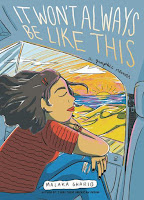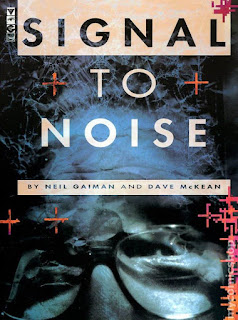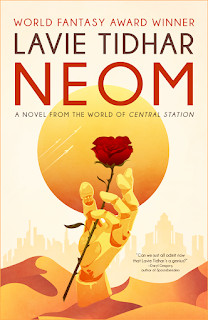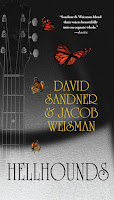I have no idea if Deena Mohamed ever heard any of those SFnal arguments: she's Egyptian and works in the comics form, but it's a big world full of ideas that bounce around, so anything is possible. Her new graphic novel Shubeik Lubeik is a masterclass in how to do worldbuilding well, immersing the reader in an alternate present that's a lot like our world in many ways, with the usual One Big Change.
This is a three-part story, and, from the author's acknowledgements, I think they originally appeared separately when published in Egypt. So call it a trilogy if you have to, but it's all one thing, and the US publication puts it all under one set of covers, the way it should be. I can't find a translation credit, and the acknowledgements seem to be in the same "font" as Mohamed's comics-pages lettering, so I'm guessing this was either originally in English or that Mohamed translated it into English herself. Either way: this is the kind of graphic story that's the product of one person, from ideas to layout to words to colors to letters.
One quick note: this reads right-to-left on the page, like manga - or, more relevantly, like Arabic in print - rather than left-to-right, as English-language comics generally do. I didn't see a notice to that effect in the digital copy I read; it should be more obvious in the physical book. And the first few comics pages have just a few panels, stacked vertically, which can obscure the reading direction at first. If you've ever read "unflipped" manga, it shouldn't be any issue, but it's something to know in order to read Shubeik Lubeik correctly.
"Shubeik Lubeik" are the traditional first words of a djinn: what he says when he's released from his lamp or bottle or whatever. In English, it would be "your wish is my command," which means we're getting shortchanged compared to the graceful rhyme in Arabic. Mohamed tells the story of three wishes here - three powerful, life-changing wishes - in a modern-day Cairo where the last century was subtly different after wishes were discovered, systematized, and industrialized.
There's some interesting background details there: Mohamed doesn't dwell on them, but she clearly understands well how colonialism works and has worked out the different ways it would have affected this changed world. Some of that is plot-relevant, especially near the end, but a lot more is just the world our characters live in. Wishes are consumer products, so there's international commerce and consumer-protection legislation, wish-mining nations and wish-refining nations, standard levels of wishes and international agreements about all of that.
That's the first thing to know about Shubeik Lubeik: it's deeper and much more resonant than you might think. It's not the story of a djinn, or multiple djinni. In this world, a wish is a powerful piece of transformative magic, but not a person. The people who matter here are all human, and what matters to them is what matters to all of us: family and partners, how to fit into the world, friends and working life, history both family and official. The difference is that they can buy wishes - strong ones are very expensive, dangerous ones are cheap - and try to phrase what they want in just the right words so they actually get it.
All three stories start with Shokry, who runs a kiosk on a Cairo street - in an American context, think of it as a concentrated, one-man convenience store or bodega, open to the air and crammed full of stuff to sell to passers-by. Among that stuff is a case with three first-class wishes: he's had them for a long time and would really like to get them off his hands.
Shokry is a good Muslim, of a tradition that says that using wishes is sinful, no matter why. So the wishes are a burden of conscience to him: he doesn't want to keep them, after all these years. He doesn't want to be the cause of bad acts of others. They are valuable, but it's a value he's never been able to tap, and he will never use them himself.
All three wishes do get used, one per section. If you know anything about wish-stories, you can guess the paths will not be smooth for the people wishing, and that having a wish is only the beginning. The three stories are all serious, with flashes of humor - the first is the most serious, with a lower-class woman, Aziza, who runs into bad trouble just trying to use her wish.
In between the three sections are more of those worldbuilding details: text features that mimic government bulletins or consumer pamphlets from this world, explaining the history and regulation of wishes, giving warnings about the dangers of third-class wishes or detailing the new Egyptian requirements for all wishes to be registered with the government and their uses approved beforehand. This sometimes prefigures things that will be important in the story later, sometimes adds color and detail to the world, sometimes makes it clear that Great Powers are just as rapacious and destructive in this world as in our own. All of it is depth: this is a living world, full of complex people, and the addition of wishes didn't change life, but it did make things different in new and inventive ways.
Mohamed has delivered here a major work, full of engaging cartooning and real people and emotionally resonant stories. She immediately leaps as a major comics-maker on the world stage, telling us stories we wouldn't hear otherwise, from a perspective new and exciting and particular and specific. Shubeik Lubeik is a magnificent achievement and sure to be one of the best graphic novels of the year.
















